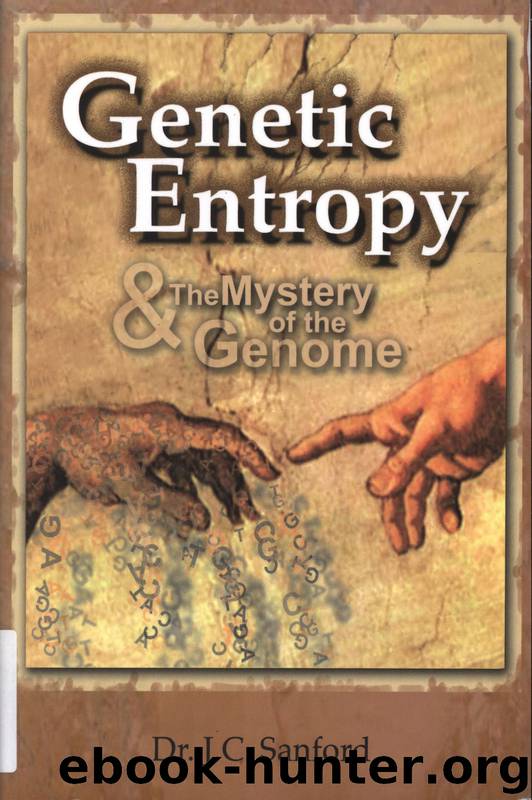GENETIC ENTROPY & the Mystery of The Genome by John C Sanford

Author:John C Sanford
Language: eng
Format: mobi
Published: 2012-08-31T15:37:40+00:00
Chapter 8 Man to the Rescue?
Newsflash - Eugenics cannot stop degeneration, and cloning makes the mutation problem worse.
Most informed geneticists would acknowledge that humans have a problem with genetic degeneration of the genome due to relaxed selection. They would probably acknowledge this problem extends to many other species and certainly to endangered species. They would probably also acknowledge the theoretical difficulties of establishing an effective selection scheme to stop the accumulation of genetic damage within the human population. However, many would also point out that the genetic degeneration process is gradual. With only a 1-2% decline in fitness per generation, they might say that the problem is not urgent. While it is true that the ultimate consequences of today’s mutations will not be felt for many generations, it is equally true that the time to halt the overall genetic degeneration, if at all possible, would be now. As the problem becomes more advanced, genetic damage will get ahead of us, with a potential run-away (meltdown) situation developing. For those hedonists who live only for today, so what? But for those idealists who pin all their hopes on the survival and advance of the human race, this should be of great importance. They are likely to turn hopeful eyes to science and technology. Can human intervention triumph over the threat? The nature of genetic degeneration is [116] such that accumulating damage is inherently diffused throughout the genome. It cannot be dealt with one gene at a time. It should therefore be obvious that the laser-like precision of genetic engineering has nothing to offer. However, we might reasonably ask if artificial selection, or the emerging capacity to clone human beings, might not solve the problem.
Eugenics to the rescue?
The general perception that man is degenerating is found throughout modern and ancient literature. All cultures have legends about “men of old” who were smart, powerful, and long-lived. Darwin’s book, The Origin of Species by Means of Natural Selection, or The Preservation of Fa voured Races in the Struggle for Life, introduced the new idea that strong and continuous selection might halt this perceived degenerative trend. He pointed to human efforts in animal and plant breeding as evidence. In his book The Descent of Man, Darwin went fuither, contending that there is a need for “superior” races (i.e., the white race) to replace the “inferior” races. This ushered in modern racism, which came to a head in Hitler’s Germany. Before World War II, many nations, including America, had government-directed eugenics programs. These programs included forced sterilization of the “unfit” and aggressive promotion of abortion/fertility-control for the underclass. Ever since the time of Darwin, essentially all of his followers have been eugenicists at heart, and have advocated the genetic improvement of the human race. When I was an evolutionist, I was also, at heart, a eugenicist. The philosophers and scientists who created the modern “synthetic theory” of evolution were uniformly eugenicists. However, after the horrors of WWII, essentially all open discussions of eugenics were quietly put aside.
Download
This site does not store any files on its server. We only index and link to content provided by other sites. Please contact the content providers to delete copyright contents if any and email us, we'll remove relevant links or contents immediately.
Sapiens: A Brief History of Humankind by Yuval Noah Harari(14389)
Sapiens by Yuval Noah Harari(5370)
Pale Blue Dot by Carl Sagan(5008)
Homo Deus: A Brief History of Tomorrow by Yuval Noah Harari(4918)
Livewired by David Eagleman(3774)
Origin Story: A Big History of Everything by David Christian(3692)
Brief Answers to the Big Questions by Stephen Hawking(3435)
Inferior by Angela Saini(3316)
Origin Story by David Christian(3202)
Signature in the Cell: DNA and the Evidence for Intelligent Design by Stephen C. Meyer(3138)
The Gene: An Intimate History by Siddhartha Mukherjee(3098)
The Evolution of Beauty by Richard O. Prum(2997)
Aliens by Jim Al-Khalili(2830)
How The Mind Works by Steven Pinker(2816)
A Short History of Nearly Everything by Bryson Bill(2698)
Sex at Dawn: The Prehistoric Origins of Modern Sexuality by Ryan Christopher(2529)
From Bacteria to Bach and Back by Daniel C. Dennett(2485)
Endless Forms Most Beautiful by Sean B. Carroll(2483)
Who We Are and How We Got Here by David Reich(2437)
